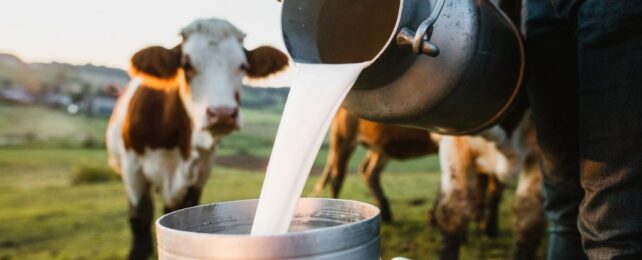A "mysterious" cow disease in the United States that causes thick and discolored dairy milk has turned out to be the first confirmed outbreak of bird flu among cattle.
According to an official statement from the US Department of Agriculture, cows at four dairy farms in Texas and Kansas have tested positive for highly pathogenic avian influenza (HPAI). Cases have also been confirmed in the state of New Mexico, though officials have not shared the number of dairy farms or cows impacted.
Apparently, scientists working to investigate the outbreak found traces of the influenza virus in several samples of cow milk before it was pasteurized. But officials say this milk is clearly abnormal and would never make it to market.
Jim Lowe, a veterinarian and influenza researcher at the University of Illinois at Urbana-Champaign, told Emily Anthes of The New York Times that the contaminated milk looks syrupy and thick. Even if this product somehow ended up on shelves, experts say pasteurization would protect consumers from the virus.
The rare outbreak comes more than fifteen years after a lab experiment showed that cattle really are susceptible to bird flu, as some experts had hypothesized.
The study was prompted by the 1997 outbreak of H5N1 in Asia that caused fatal infections in wild birds, poultry, and even humans. Pigs were infected in a 2005 outbreak, but for years, it wasn't clear if ruminant farm animals, like cows, could be infected, too.
Since the late 1990s, scientists have hypothesized that the bird flu can jump over to cattle from humans or other animals, but clear evidence has been lacking. Sick cows in the United Kingdom were found with rising antibody levels to human strains of H1N1. And in 1999, a study found evidence that cows with reduced milk production showed signs of an influenza infection.
The recent contagion spreading among dairy farms in the US, however, is historically unique.
So far, it has impacted roughly four dairy farms, and only about 10 percent of each affected herd. Some farmers have noticed deceased wild birds on their property, too, which suggests the source came from migrating avians.
Luckily, few to no cows have died from the virus so far, but the infection drives a sharp drop in milk production, sometimes up to 40 percent, that usually lasts for a week to 10 days.
The Texas Department of Agriculture (TDA) says it is "vigilantly monitoring" the virus' spread.
"There is no threat to the public and there will be no supply shortages," says Commissioner Sid Miller.
"No contaminated milk is known to have entered the food chain; it has all been dumped. In the rare event that some affected milk enters the food chain, the pasteurization process will kill the virus."
The USDA press release also assures the public that pasteurization has "continually proven to inactivate bacteria and viruses, like influenza, in milk".
Scientists are now sequencing the genome of the virus to figure out where it came from and how it jumped to cows.
This very same month, a handful of goats in the state of Minnesota also tested positive for H5N1, becoming the first domestic ruminant in the US to fall ill with bird flu.
"This finding is significant because, while the spring migration is definitely a higher risk transmission period for poultry, it highlights the possibility of the virus infecting other animals on farms with multiple species," said state veterinarian Brian Hoefs in a statement for the American Veterinary Medical Association earlier this month.
"Thankfully, research to date has shown mammals appear to be dead-end hosts, which means they're unlikely to spread HPAI further."
Since late 2021 – which marks the start of an ongoing bird flu outbreak among US poultry – officials have recorded more than 200 cases of HPAI in mammals, such as foxes, racoons, possums, skunks, seals, leopards, bears, mountain lions, and bobcats.
Cows and goats can now be added to that list.
"Unlike affected poultry, I foresee there will be no need to depopulate dairy herds," says Miller.
"Cattle are expected to fully recover. The Texas Department of Agriculture is committed to providing unwavering support to our dairy industry."
